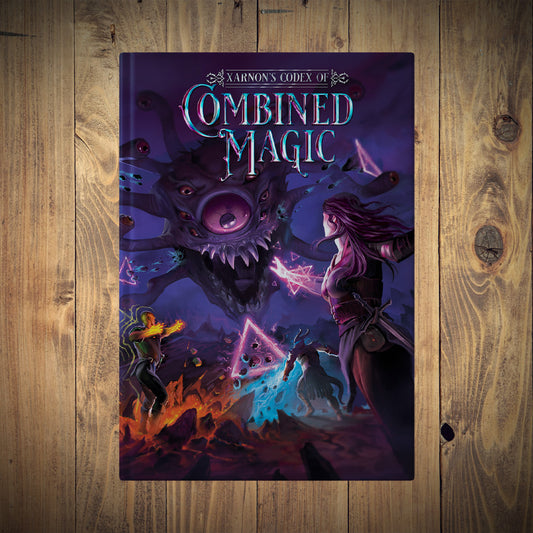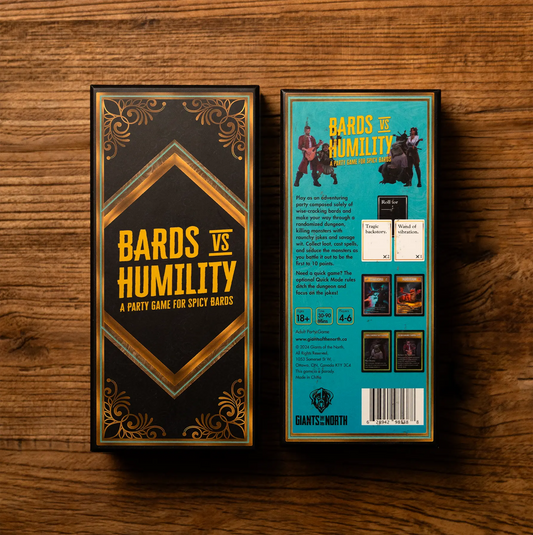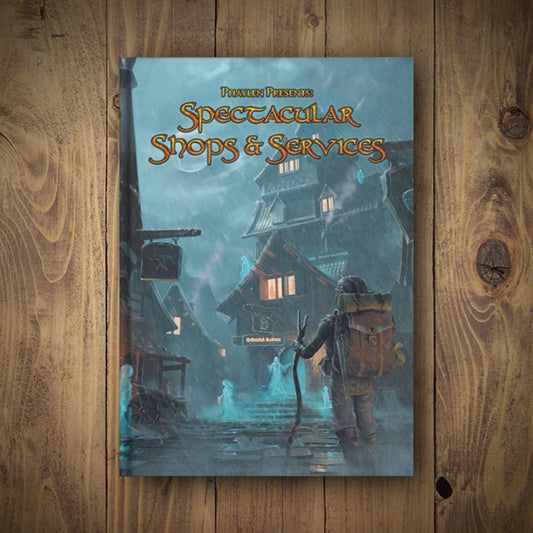
Magic in Dungeons & Dragons: A Guide to the Arcane and Divine Mysteries
Share
In D&D, magic is divided into two categories: divine and arcane. This division can refer to the type of magic, or how it is accessed by spellcasters. Divine magic is granted to spellcasters by the gods, and arcane magic is drawn upon directly by the spellcaster. While there is some ambiguity around some magic-using classes (eg. the nature-oriented divine magic of druids is accessed without the gods, the arcane magic of warlocks is accessed through a god-like or demon-like entity), it’s generally a dualistic distinction that mirrors Western Civilization’s categories of the religious versus the secular, or faith versus science. At best, this dynamic creates an interesting opposition; at worst, it’s a boring and potentially offensive dualism of superstition/faith versus science/technology.
This article guides you through some questions to help you build a simple yet effective ‘cosmic view’ of magic for your setting. By considering these ideas, you can add depth to your world and engage your players by showing them that magic isn’t just an alternative version of technology. However, keep it straightforward—nothing kills player interest faster than an information dump.

What is magic?
Begin by considering the relationship between the natural and the supernatural, or the mundane and the magical. Is the cosmos defined as physics + supernatural, where magic is a layer added to the ‘normal’ world? Or is the cosmos a single integrated whole, where magic is an intrinsic part of reality?
What does this mean for magic in your world?
Magic as an add-on to the world
If magic is a separate layer added onto the world, It’s possible to imagine a world without magic. To a certain degree, this is how most ‘modern’ people see magic today, and how many people see it when playing D&D. The distinction between magic and the mundane is not just perceptual, but actual.
Magic and magical creatures are an imposition on the world, an alien force that has no place in the natural order of things. Spellcasters are people who manipulate an extra-cosmic or alien force. This will obviously have a big effect on how spellcasters are perceived by others, and how they perceive themselves. It would be very easy to see spellcasters themselves as alien.
The distinction between arcane and divine magic is not as important as their fundamental ‘otherness’ - one is channeled through alien super-being (gods), while the other is accessed directly. Both are more than a little terrifying - arcane spellcasters who dabble in forces that literally do not belong in the world, or divine spellcasters granted magic by nearly-alien beings. You then have gods that pretend to be from the world (and are therefore deceptive), or remain alien and knowable (and therefore terrifying).
Magic is built in
On the other hand, If magic is an integrated part of the cosmic order, the distinction between physics and magic is a matter of perspective or ignorance. Magic is built into the fabric of the world, even if it does not appear that way. Magical creatures are not separate from the world, just an obvious manifestation of its usual hidden wonders. Spellcasters are people with the ability to draw on the natural forces of the cosmos.
However, this does not necessarily make magic safe, or a mere extension of physics.

How is magic integrated into the cosmos?
When gods, demons and spellcasters use magic, just what are they playing with?
Here are two general ways of thinking about how magic is integrated into the world.
Magic as Chaos: Magic is a primordial, undefined potential that is itself the raw potential for anything and everything. It is the undifferentiated somethingness that cannot be named or described without quickly straying into error because it comes before the order that allows for description - but the cosmos could not exist without it. Order is established by the gods, or divine/natural laws imposed upon that raw potential. In the book of Genesis, chaos is the void that God shapes into the world; or it is the Tao, the wellspring of creativity from which the world originates.
Magic as Order: Magic is the source of order in the world, similar to the laws of physics but encompassing phenomena beyond our scientific understanding. Magic is the force something-ness that makes the cosmos what it is. It is the God of Genesis, the source of order over chaos; or kind of like the Force from Star Wars, created by and binding together all (living) things.
These concepts will affect how players view magic and how their characters interact with it. If magic is chaos, it is by its nature extremely dangerous and unpredictable, so people, educated or not, have good reason to fear magic and magic-users. It’s like small children playing with fire - they know it burns, but have no understanding of how it starts, how it works, how it spreads, and virtually no way to control it.
If magic is order, magic is structured, but that does not mean it is well understood even by its practitioners. Again there is reason to fear. It’s more like adults playing with fire - things can still go very, very wrong. Even if it could be used safely, magic is clearly still a source of great power available only to some, which brings its own problems.
What are the consequences of these visions for D&D’s traditional division of magic into the arcane and divine? Before addressing that, we need to think about how gods, demons and other powerful magical entities fit into the cosmic order.

What is the Relationship Between the Gods and Magic?
Are the gods the ultimate source of order and magic, or are they a part of the cosmic order like everything else, a sort of immortal, powerful magic-user? (This also raises the question of whether demons are simply evil gods, or something else - that’s for another post). This has a profound impact on the place of the gods (or demons) in the cosmos.
If the gods are the source of magic in the world (like the God of the Bible and Koran), they are responsible for creating and shaping reality. They are therefore the source of both divine and arcane magic, since everything ultimately comes from them.
It’s pretty clear where divine magic comes from in this case - from the divine source(s) of the cosmic order itself - whether this is a god or gods or some form of impersonal cosmic order. That is, from prayer, or some mystic connection to the cosmic order. But what about arcane magic?
If the gods are the source of magic in the world, arcane magic-users access the cosmic order without the gods. You have to ask - how did they learn to do this? There are three possibilities: magic was taught by the gods; it was stolen from the gods; or it was learned completely independently. The final explanation is the most common interpretation, since it is modelled on modern science. It is also the most unlikely. that model might work if science had another 10,000 years of knowledge behind it, but the kind of stable civilization required for that would be difficult to achieve. you could also argue it’s impossible, given mortal limitations - like a dog learning calculus, it’s just not possible given their cognitive architecture.
But what if the gods are a part of the cosmic order?
This means the gods are more like higher-order arcane magic-users, who sprung into existence with the ability to use magic. While they may be so powerful that they are capable of granting spells to their followers, they are not the source of arcane magic. They might have an instinctual ability to use magic that is far more powerful than that available to mortals, but they get it from the same place lesser magic users do. They are still subject to a cosmic order they did not create themselves.
They could grant the ability to do magic (divine), or teach it or have it stolen (arcane), but it would be somewhat more limited than magic granted or taught by gods who are the source of creation itself.
This raises the question of the relationship between the gods and spellcasters - specifically the spellcasting or magic-using classes of D&D.
What does this mean for D&D classes?
I’ve already discussed some of the ways this can apply to arcane and divine spellcasters generally. What follows is a brief rundown of how these ideas might shape different classes. This really deserves its own article (or articles), but this is a brief overview:
Wizards:
In all the scenarios above, wizards access magic directly, rather than mediated by the gods. This does not necessarily make wizards secular scientists. If the use of magic was taught or stolen from the gods, wizards now have a pretty good reason to attach themselves to the gods or a religion, since that is the ultimate source of their knowledge. There will always be an ungrateful few who refuse to acknowledge where they get their power - but that’s a pretty dangerous proposition in a world where the gods are real. If wizardy was stolen from the gods, that places wizards in an extremely difficult (and interesting) position - they may attach themselves to a religion that promises to protect them from the gods from whom magic was stolen. The different schools of magic could represent the types of magic taught by different gods.
It’s also quite possible that wizard magic is not simply a matter of book learning, but requires meditation and revelation. Perhaps the gods grant visions to some mortal, rather than spells, and these visions are an integral part of arcane spellcasting - a necessary appendage to the spellbook. This is another opportunity to tie wizards to the gods and religion - because revelation is an ongoing need.
Clerics:
Clerics are pretty straightforward - gods grant them spells, usually in response to devotion. Or they align their inner being with the cosmic order, and gain spells. This implies a certain self-discipline, or at least some kind of self-ordering along the lines demanded by a god. Clerics who gain spells through devotion are more likely to trust those who gain spells from the same god, whether this refers to other clerics, or wizards belonging to the same religion or cult.
Druids:
Druids tap directly into life’s energy. This could mean they access the cosmic order through the lens of the natural world (as a matter of focus), or through a nature deity. Equally possible, druids could draw upon the raw potential of chaos itself - druidic spellcasting is simply one version of shaping chaos.
Since druids will often have no association with a deity (whether through directly intuiting the cosmic order from a ‘divine’ perspective focused on living things), or through chaos (again focused on natural life), their source of power is more mysterious.
Sorcerers:
Sorcerers channel arcane magic through innate ability. In a world where the gods are real, the vast majority of people (including sorcerers themselves) are likely to see sorcerers as divinely chosen, or descended from the divine or from magical creatures (as per the Player’s Handbook).
Warlocks:
Warlocks are interesting, since they are granted access to arcane magic by powerful beings - these beings are god-like, even if they are not usually called gods themselves. The relationship between spell granter and spellcaster is often seen as transnational, rather than devotional - the warlock gets spells in return for service, not love. This is likely to disturb both clerics and wizards alike. To clerics, it seems selfish and an indication of the ugly nature of the spell granter; to wizards, it could be seen as a cheap and easy way to learn the use of arcane magic - one they criticize, or want to use themselves.
Monks:
Monks are generally portrayed as people who achieve strange powers through a combination of self-discipline and mystic understanding. This is not a lot different from the self-discipline described above for any of the classes - only expressed through the lens of the body. Monks could be channeling chaos through their special practices and wisdom, or aligning themselves with the cosmic order and gaining strange abilities based on that. While more of a stretch, their magical abilities could be based on alien magical forces.
These are just a few suggestions - there are many, many different potential ways you could apply the different visions of magic expressed above. The point is to think about the questions and ideas above and apply it to your world - but keep it simple for two reasons. First, if you can’t describe your vision for magic in 4 or 5 key points your players will almost certainly lose interest. Second, if you get too detailed, you will restrict your player’s imagination. Simple answers to the above questions leave your players a lot of room for interpretation that still fits within your general vision. This will allow them to tie their characters to the world, investing in the setting more deeply - which itself leads to all kinds of story and role-playing possibilities.
Have fun.
Blaine





